You know it is Christmas at No 8 Village, West Coast Berbice when the aroma from the black cake baking in a huge mud oven fills the air. Starting about a week before Christmas, women from the village take their pre-mixed cake in large bowls to the home of 82-year-old Julia Melville, who pours it into pans which she places in the oven in her back yard.
The residents also bake their own bread for the pepperpot, which passers-by can smell bubbling away in almost every home about three days before Christmas. As they add the final touches to cleaning and decorating their homes, residents start to feel the spirit of the holiday season.
Melville’s youngest daughter, a nurse, explained that for the black cake they would “light the oven with banga [coconut] shells.” And to maintain the desired heat they would “attach pieces of black sage on a long stick and use it to pull the excess heat in a corner.” Some of the “heat” would be used to “continue feeding the light hole while the cake is baking.” Melville and her four daughters would also bake enough cake to distribute to persons who cannot afford it, as well as to friends.
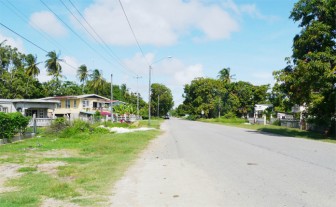
For themselves, the preparations for the cake would begin earlier in the year when they would use whatever fruits are available in the yard, like papaya, gooseberry, cashew and five-finger to make a sort of jam. That would be “soaked in wine. The longer the fruits are soaked the
better the texture and flavour would be.”
Melville, fondly called ‘Aunty Baba’ learnt to bake at a young age from her mother, and after she got married she started to do it on a commercial basis to supplement her husband’s income.
She sold her bread and cakes at the Bath Estate while villagers would also visit her home to purchase them in wholesale quantities to resell.

access dam to residents’ homes and the backdam
Her daughters have followed in her footsteps and the eldest make cakes and goodies every day to sell. Two others, Oslyn, an auditor and Alexis, a teacher are engaged in catering, making mostly cakes and dhal puri for parties and other occasions.
Although No 8 was buzzing with activity for the holidays, Melville said Christmas time in her day was “very very nice, not like now.” She reminisced that “everybody used to get together and spend Christmas, and on Boxing Day we would go and visit friends’ homes. But that doesn’t happen now; everybody to themselves now.”

Her parents used to purchase toys for her and her 13 siblings but with a chuckle she remembered, “You know long ago when they buy the toys they would say that Father Christmas bring them. But you can’t tell children that now because they don’t believe you…”
Her daughters who teach at the Sunday School department of the Freedom Life Ministry Church at No 9 were also preparing to cook for a party for the 80 young students. The children would also be given presents and the department was also planning to invite a few underprivileged children to be part of the treat.
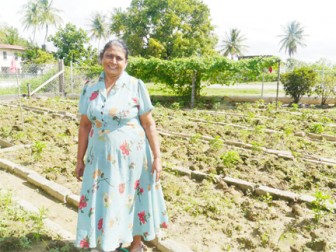
No 8 Village is made up of different ethnicities, but residents said they do not differentiate and “we don’t have any problems here.” A resident told this newspaper that “everybody lives here like one big family.” He moved from another village where persons would “steal little items like flower plants.” Since he started living at No 8 some years ago he “never lost anything. Everybody looks out for each other. That is the beauty of this place.”
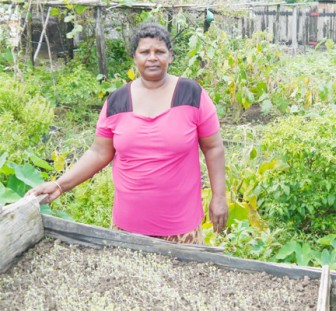
displays some young plants
According to him, “If somebody sees something funny they would investigate. One day a man [from a different area] tried to steal a bag from someone’s home and a neighbour saw and shouted at him to put it back. He did and he ran away.”
Some of the drains and streets in the village appeared to be well kept. And while the major part of the access dam to the backdam and the trench was also well maintained, residents bemoan thedeplorable condition at the head of it. An overseas-based resident, Andre Nedd said the authorities “just dig the trench and did not put any tube to drain the water; the water would ride over the dam and cause it to be undermined…”
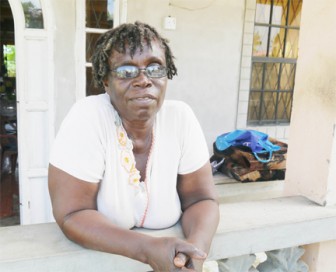
Alvin Pluck, a rice farmer was returning from the backdam on his bicycle. He had gone to check his rice and said the rainy weather had caused some of the fields to be flooded. He had made water tracks and the water had started to drain slowly.
In another section, Tony Colho who has been working at Mabura as a logger for the past year was socializing with some friends. He returned home to spend the holidays with his family but was not sure what Christmas would be like for him because he had not received his payment.
He was not certain about buying presents for his children this year, but he knew that they would all be going to church together on Christmas morning and later would have a nice lunch and he would “take a drink.”
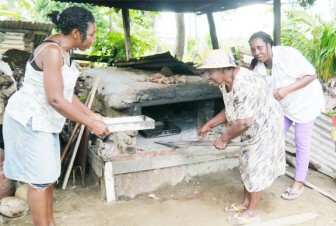
William Bourne who was also there socializing said he worked with a private owner who took over a ranch at Kabawa from the government. He was among 18 persons who was wrongfully dismissed in 1985. He said, “till now I can’t get my money. I used to borrow money from myfriends to reach to the high court…”
Located down in a street on the northern side is the No 8 Primary School. The school was first housed at the now abandoned No 8 Church Hall along the roadside. The Woodlands/Bel Air Neighbourhood Democratic Council office is also nearby. Opposite the school is the community centre that has a large pavilion. Nedd observed that the ground needed upgrading so that theyouths could benefit. Nearby is the No 8 Secondary School which was built a few years ago to accommodate the low achievers in Region Five.
This newspaper stopped to take pictures of some young boys liming in a stall close to the school two days before it was closed for the holidays, but when they learnt the photo would be in the newspaper, they started to scoot in different directions.
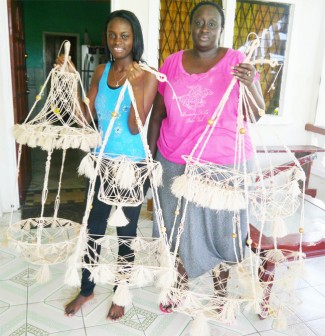
display the hanging baskets
Kelsey Sahadeo, a vendor was sitting in her stall in front of the primary school with her two sons, Asher, 11 months and Shamaul, 4. Her husband works as an electrician and her mother helps out with the children sometimes.
Nearby, Maywattie Persaud, operates a snackette at her home which gets support “mostly from the schoolchildren.” She also plants a kitchen garden and proudly displayed her crop to this newspaper. Her husband, with whom she shares a disabled 12-year-old son, works as a cane-harvester. Her other grown children are from a different union.
Gloria Brijlall, 60, was mending her clothing on her sewing machine when the Sunday Stabroek dropped in. She learnt to sew when she was young by “looking at a cousin” who was a seamstress. One of her two sons who lives with her assists her to plant sweet peppers and sometimes celery in her yard to earn an income. She would wholesale her produce to hucksters.
Brijlall wanted to “know why it is that the areas from No 4 to No 10 do not have landline telephones. We made a lot of petitions and the company did investigations and still we cannot get the service.” She said they were given “antenna phones before but that stopped working a long time now.” She said too that the street lights have not been working since November and that they made reports to the authorities.
She moved from No 11 Village and she enjoys living at No 8. The people are “nice and friendly.” She plans to prepare her fancy dishes on Christmas Day before going to church at No 9 and would return home for a quiet lunch with her family.
A short distance away, Hyacinth Semple, a retired health centre attendant was busy cleaning her house. She was planning to decorate it the same evening because she wanted her house to start having the festive look. Semple who vends at the school was one of the persons who would bakeher Christmas cake in Melville’s mud oven. She also bakes her own bread because the “shop bread don’t taste good with the pepperpot.”
Across the road, Sandra Johnson was also busy with her Christmas cleaning. She will be putting up her decorations and fairy lights on Christmas Eve night. She and her family would then go to Rosignol where the celebrations are hyped up with loud music, parties, Santa Claus, shopping and persons just walking around. On Christmas Day she would have a “little family gathering,” with delicious dishes and champagne.
A few hanging baskets that her husband, Andre Carrington makes to sell were displayed in front of her house. He has been making them for a number of years. Her family moved to the village from Linden seven years ago but she still misses Linden and “cannot handle the mosquitoes and blackout.”
Lester Cummings called Commo, who operates a small Guinness Bar in front of his home said business is brighter around Christmastime. Cummings who loves the village plants a small kitchen garden and enjoys “eating dhal and rice and bhajie” that he cooked that day.
Julian Blair, a barber has established a small shop by the roadside to ply his trade. Business would normally be slow but it had started to pick up for the holidays because “everybody wants to look nice.”





